- About Us
- Columns
- Letters
- Cartoons
- The Udder Limits
- Archives
- Ezy Reading Archive
- 2024 Cud Archives
- 2023 Cud Archives
- 2022 Cud Archives
- 2021 Cud Archives
- 2020 Cud Archives
- 2015-2019
- 2010-2014
- 2004-2009
 |
(May 2016) The Problems with Bernie |
I need to complain about a dishonest poser in the 2016 presidential-election cycle—and I’m not talking about Donald Trump. The Donald is a whole other article, but it would be so full of obvious points as to have no need of being written.
No, I’m talking about Bernie Sanders. Now I’ll pause while you ardent Sanders supporters lose your minds.
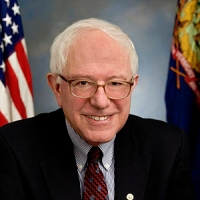
<< ELEVATOR MUSIC>>
I’m not a registered Democrat, although the Democrats think I am. I have never voted as affiliated with any political party. I’m a liberal atheist, so I tend to vote Democratic, and I’ve only ever donated to Democrats, because I believe in liberal, progressive ideals that don’t hamper freedom, deny equal rights, or demand that I follow Biblical directives.
When Bernie Sanders first broke onto the election scene, I was very impressed. I liked him and I loved his progressive ideas. I liked his over-the-moon liberal proposals. I felt that he could energize the Democratic Party, retain the White House, take the Senate, and maybe take the House.
But in recent months, reality has kicked in, and Sanders has problems I cannot ignore.
Part I:
Where Are the Specifics?
The first is the vagueness of his ideas. They’re good ideas—socially utopian proposals that create excitement at rallies. But where are the specifics? Sanders has espoused many of these heart-pounding ideas that get America’s liberal youth pumped up. But there’s the key: youth. Sure, they’re the future, but no matter how involved young people are in politics—and it’s GREAT that they’re so involved—they’re still young. They’re inexperienced. They’re naïve. And they respond exuberantly to their favorite candidate tossing out vague, nonspecific goals without any clarifying framework.

Now, I’m not saying that all young people are inexperienced and naïve—just the vast majority of them. It’s okay; I remember what being that young was like. I remember the feelings of invincibility, of knowing that I was right, and thinking that nobody else had the insight that I did. But now that I’m approaching the half-century mark, I can look back and clearly see that my inexperience and naivete clouded my judgment.
We didn’t have instantaneous access to a wealth of worldwide information when I was in high school—and this is coming from a guy who was online in the 1980s before most people even knew what the Internet was. But anyone today—especially the young people—should know how to do some solid online research to figure this sort of thing out. Sanders isn’t promising a chicken in every pot, but as marvelous as many of his pie-in-the-sky claims might sound, he’s terribly short on details to explain how he’ll achieve these goals.
This is not something we usually see associated with Democratic candidates. We frequently see it with Republicans, though: young, inexperienced, and naïve supporters who blindly follow sensationalist conservatives who scream out great ideas without any plans to make them reality. This is typical of the impoverished conservative voters who are apparently too stupid to realize that there hasn’t been a Republican candidate in roughly FOREVER who will benefit them aside from opposing abortion, talking about Democrats taking their guns, and praising Jesus.
Sanders is doing exactly what Donald Trump is doing: spouting the sort of rhetoric that sounds great at rallies but has no real substance, no details to support that rhetoric. And Sanders supporters are starting to behave that way—blindly following a bevy of unexplained goals. The last thing we need with progressive, liberal ideas is the attitude of “We have no idea HOW we’ll accomplish these things, but we’ll SAY them and figure it out later… and hope you don’t ask questions!”

Now, this alone doesn’t make me dislike Bernie Sanders. I think he’s sincere when he poses his progressive ideas. I think that when he spouts a marvelous idea and his frenzied white hair makes him look like Doc in Back to the Future, he believes in what he says. He means it. He really wants to change America. He truly wants to benefit lower- and middle-class people. He really wants the revolution he talks about. I have no doubt of that in my mind. I think that Donald Trump merely SAYS whatever will get his crowds yee-hawing. Trump has gone from one rally or reporter to another with different stances on various things—sometimes in the same day—so it’s pretty easy to see that he’s just pandering to whatever supporters happen to be beating up protesters at the moment. He says what will get that crowd riled up, whether they’re wearing NASCAR shirts or Confederate flags, whether they’re white or white, or whether they’re blacks or Hispanics who must be deeply confused.
Not Bernie Sanders. He isn’t pandering. He truly wants a revolution. He wants to change America. And if his rallies take on Trumpesque qualities, so be it.
Part II:
Is Bernie Becoming Donald?
That’s where the next thing that bugs me comes in. In another way that the Sanders campaign has begun to mirror Trump’s, Sanders supporters have begun to “Feel the Bern” to such a high degree that they’ve apparently begun throwing temper tantrums. At the Nevada Democratic convention, Sanders supporters were upset over believing that the party heads stole 60 delegates from Sanders, but in reality they were deemed ineligible due to rules violations. That didn’t stop the tantrums. Reports of a thrown chair appear to have been exaggerated, but there is video of a man raising a chair over his head before apparently thinking better of it and putting it down. Maybe he just needed a quick workout.

What isn’t up for debate is the huge number of death threats made against Nevada Democratic Party Chairwoman Roberta Lange and her family, thanks to someone leaking her cell number; she received over 1,000 calls and up to three text messages every minute. What isn’t up for debate is that the angry supporters were unruly enough that security shut down the event. This was the sort of thing we’d expect from Trump supporters.
“It is never OK for violence and intimidation to be the response to that frustration,” said Debbie Wasserman Schultz, the chair of the Democratic National Committee. “That's what happens with the Trump campaign. We can never resort to the tactics that they engage in.”
What a beautiful, unifying lead-in! And all Sanders had to do was agree and tell his supporters to knock it off and act like grown-ups instead of Republicans. Other Democratic leaders joined that unity, asking Sanders to speak out against this as well, but that didn’t happen.
“We can have a long conversation about Debbie Wasserman Schultz just about how she’s been throwing shade on the Sanders campaign from the very beginning,” Sanders campaign manager Jeff Weaver said on CNN’s “New Day.”
Sanders issued a statement instead deflecting attention to shots being fired into his campaign office months before. That had nothing to do with the issue at hand. Was he saying that violence deserved more violence? Was he implying that Clinton supporters were responsible for those fired shots? We don’t know. What we do know is that Sanders called the Democrats’ concerns “nonsense.” Yeah, great show of unification, Bernie.
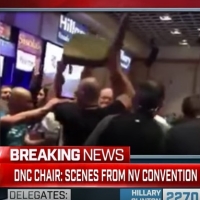
He did say that “Our campaign of course believes in non-violent change and it goes without saying that I condemn any and all forms of violence, including the personal harassment of individuals,” but then he went off the rails whining that his campaign was robbed in the Nevada delegate process, which is presumably why those excitable supporters were so frustrated as to do the things that they did. “The Democratic leadership used its power to prevent a fair and transparent process from taking place,” he said.
It was encouragement of violence disguised in a cardboard “Of course we condemn violence” statement. Nicely done. He should have kept his complaints separate from his condemnation and made it unequivocally clear that he did not approve of the violence and told any supporters who disagreed with him that they were not welcome supporters in his campaign.
As for the complaint about those 60 delegates: They were deemed ineligible under rules in place since 2014. Despite his understanding of how the system worked within the party, Sanders could only complain about a process wherein he lost, fair and square.
Part III:
Is Complaining His Only Skill?
That leads me to my next complaint about Sanders: his claims of unfairness. Ever since it became obvious that he wasn’t going to win the nomination, he hasn’t shut up about how unfair the Democrats have been. He has complained that in states where they only allow Democrats to vote in primaries and caucuses he is treated unfairly because his strong base of independents can’t participate. It’s undemocratic! They’re cheating him! They’re cheating his supporters! But unless Sanders is as inexperienced and naïve as his young supporters, he is just plain lying.
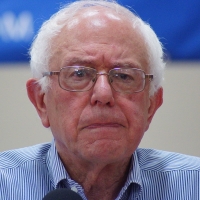
Political parties are private organizations, not government entities, and they make their own rules. I don’t understand why ANY of them would ever hold open primaries and let non-Democrats vote in the first place. It makes no sense. It would be like McDonald’s asking their shareholders to vote on the company’s strategic plan, but allowing Burger King shareholders to vote along with them. If you want to vote in a Democratic primary, you should register as a Democrat.
The bigger picture here is that Bernie Sanders went into this fully understanding how the process works in every state. At some point he realized that despite being more popular than anyone had ever expected, there was no way he’d ever win the nomination. There was only one thing left that he could do then: bitch and moan about the process that he fully understood when he jumped into this thing a year before. Come on! If you agreed to play a basketball game to 100 points and your opponent got there first, do you admit defeat or do you complain that the game was unfair? Hint: Don’t shoot hoops with Bernie Sanders unless you’re prepared to let him win just so you don’t have to listen to his griping.
He complains as well about superdelegates, who are elected Democrats and distinguished party leaders who can vote however they choose at the Democratic National Convention. So, even if one candidate wins 100 percent of all votes during a state primary, a superdelegate from that state could vote for the candidate who got no votes. Since the beginning of this election cycle, far more superdelegates have put their support behind Hillary Clinton. This, naturally, infuriates Sanders, and so he bitches and moans about how unfair it is.
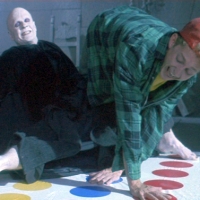
But like the other rules, how superdelegates vote is spelled out well in advance. Sanders knew it, but now that he’s not going to be the nominee, he whines about it. But he has nothing legitimate to whine about; this is how the Democratic Party does things, and Sanders shouldn’t even try to argue this with a straight face. Like the basketball-game example, if your opponent got to 100 points first, you have no right to demand that the rules be changed.
I keep thinking of the scene in Bill & Ted’s Bogus Journey, where Bill and Ted have to play Death for their souls, and every time they win Death keeps trying to change the rules. Best two out of three? Best three out of five? Best of seven?
Tough luck, Bernie; you knew the rules when you began playing.
Part IV:
What Is His Party, Really?
And that leads me to one more complaint about Bernie Sanders: his party affiliation.
One might excuse Sanders for not understanding how the Democrats do things, given that he has only been a member of the Democratic Party for a year.
From 1971 until 1979, Sanders was a member of the Liberty Union Party, a radical-left party focused on socialism, anti-war, and anti-capitalism. This is the kind of party that will be nice when its ideals become the accepted norms, but that currently will ensure that you never get elected to much of anything. Sanders didn’t. He lost a special Senate election in 1972 with just 2.2 percent of the vote, and a gubernatorial run that same year with just 1.1 percent. In 1974, he garnered 4.1 percent when running for Senate, and lost the governor’s election again in 1976 with 6.1 percent.
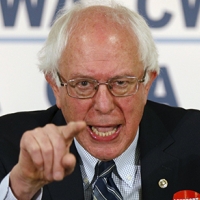
But from 1979 until 2015, he was an independent, unbound to someone else’s party platform, free to campaign exclusively on his own platform. This is admirable, and it paid off, because Sanders remained an independent for 36 years. It worked from the start; in 1980, he was elected mayor of Burlington, Vermont, and reelected three times, serving from 1981 to 1989, winning anywhere from 43 to 55 percent.
After a failed attempt in 1988, he was elected to represent Vermont in the House of Representatives in 1990, with The Washington Post calling him the first socialist elected to the House in decades. He won reelection seven times and served there for 16 years. He then won a Senate seat in 2006 and was reelected in 2012.
Early in his congressional career, Sanders often alienated himself from both Republicans and Democrats, but eventually mostly aligned himself with Democrats, whose liberal ideals, while perhaps not as progressive as he’d like, were clearly far better than any Republicans would be. He often gave the Democrats a majority in the Senate by caucusing with them. But Sanders was always a proud independent with his own ideas.
Until 2015, anyway. When he decided to run for president, he must have realized that he’d never win as an independent; only George Washington, a staunch opponent of political parties, had ever been so elected. But Sanders knew that it was time for a political revolution for his ideas. He’d certainly never win a Republican nomination, so when faced with presidential aspirations that would never come to fruition if he ran as an independent, he joined the Democratic Party.
As I write this, it is May 26, 2016—exactly one year after Sanders launched his presidential campaign. It’s the first anniversary of a man who knew that his independent status would never win him the White House, prompting him to abandon his independent stance to join the Democratic Party. And since then, he has viciously attacked Hillary Clinton, who will be the Democratic nominee. He has refused to appeal to his supporters to cut the Trump-ish violence. He has whined incessantly about the rules of the Democratic primaries and all but demanded that they be changed for him and for his non-Democratic supporters.
I don’t think he expected to get this far. I think that, early on, he really just wanted to begin that political revolution. But oh, the taste of the presidency is so close—yet so bittersweet because he knows that he won’t win. The Democrats have even awarded him the choice of a certain number of representatives on the committee that will draft the new party platform. My prediction is that they won’t be happy if every last thing doesn’t go their way, because that’s what Sanders has been all about so far.
Part V:
Political Devolution
Bernie Sanders is an opportunist who joined a party just to run for president, under the guise of a political revolution. I believed him at first, and he was exciting. But recently, he’s spiraled downward and out of control. He’s like a child who doesn’t understand the rules of the game, demands that he be allowed to play anyway, and stomps his foot when he can’t win. Yet his legions of supporters seem to follow him blindly and see nothing but revolution. The word “revolution” would make more sense if at least Sanders were crushing Clinton in the popular vote, but she currently leads him 13 million to 10 million. Where’s the revolution here?

I really was excited about Bernie Sanders a year ago. I continue to be excited by his ideas. But his character has failed in recent months, and has failed ever worse as his path to any possible victory has been erased. He could have taken the high road and graciously accepted when the math was not in his favor, rallied his supporters behind Hillary Clinton, and constructively worked to advance the Democratic Party’s platform toward his progressive goals so the party could put its effort and money into opposing Trump. Instead he has bullied, complained, been disingenuous, and refused to be part of any unity in keeping a Democrat in the White House. Even ignoring the superdelegates in the tallies, if Clinton wins enough delegates otherwise to secure the nomination, I suspect Sanders will even then still claim that it was all somehow unfair, rigged, and Machiavellian.
Any Sanders supporters who have read this far no doubt have labeled me a Hillary Clinton lover. I am merely a supporter of liberal ideals, and a year ago Clinton and Sanders were equally appealing to me. But in that year, she has been solid and has earned my support, while Sanders has been shaky and constantly eroded it.
Hillary is all about party unity, just as she was in 2008 when she was much closer to Barack Obama than Sanders is to her now. Bernie is about Bernie and his narrow vision that has no room for compromise or for things not going his way.
Hillary has spoken positively about Bernie more times than I can recall. Bernie has crapped on Hillary more times than I can recall, and in ways that will make it very difficult for him to support her later.

Hillary has offered grand ideas with specifics to explain how she’ll do things. Bernie has offered grand ideas without any particulars to back them up.
Hillary has a base of supporters who seem more like what we’d expect from a Democrat. Bernie’s base is increasingly more like Donald Trump’s, and he makes no move to get them in line, despite having great influence over them. He could straighten them out; he just clearly doesn’t want to.
Hillary supports liberal and progressive ideas with realistic beliefs. Bernie supports the same ideas without any willingness to work with others and compromise, which all but ensures that, if he were president, he would get less support from Republicans in Congress than Barack Obama has.
Hillary has been a Democrat since 1968, serving as First Lady of Arkansas for 8 years, First Lady of the United States for 8 more, a Senator for New York for another 8, and Secretary of State for 4. Bernie became a Democrat one year ago, in order to run for president. I wonder: If he were to win the presidency, would he abandon the Democratic Party and return to being an independent again?
I look forward to Bernie Sanders’ political revolution. It just isn’t happening his way, all at once, right now—and certainly not by being elected president in 2016. If someone is to ever make that revolution happen, it won’t be Sanders if continues to behave the way he has been behaving in recent months.
David M. Fitzpatrick is a fiction writer in Maine, USA. His many short stories have appeared in print magazines and anthologies around the world. He writes for a newspaper, writes fiction, edits anthologies, and teaches creative writing. Visit him at www.fitz42.net/writer to learn more.
